SOUTH KOREA. The country’s big four duty-free retailers all posted heavy third-quarter losses as they continue to struggle in the face of soft spending by Chinese visitors, reduced daigou business and – in some cases – increased airport rents.
According to leading business title Korea Economic Daily (KED) this marks the first quarter in almost two years that all four have fallen into the red.
The Q3 figures continue an alarmingly negative 2024 trend. As reported, Korea Duty Free Association figures revealed a -22% year-on-year fall in first-half average spend to KRW535,000 (US$400).

In June, Lotte Duty Free announced an emergency management strategy involving workforce restructuring, organisational slimming and a -20% reduction in executive salaries.
“Korean duty-free shops, once golden geese for retailers, show no signs of recovery and are likely to widen losses in the coming quarters,” KED wrote.
The title reported that Shinsegae Duty Free recently set up an emergency management task force team while Hyundai Duty Free replaced its Chief Executive in October.

“The crisis in Korean duty free seems to be deepening as the Chinese and Korean economies are deteriorating while the travelling vs shopping trend is changing,” one senior Korean duty-free executive told The Moodie Davitt Report.
“2025 will be a very tough year too for them all. It will not be easy to turn around this aggravating situation soon. It seems that the retailers have few options other than stark measures such as downsizing and redundancies.
“Many worry that from Q4 concession fees for Incheon International Airport might be increased a lot due to the completion of the store expansions. But the spend per head in Incheon seems to be staying around 70-80% of pre-COVID levels. This will be a big burden to the retailers as well as a headache to Incheon International Airport Corporation.”
Echoing that dilemma, KED wrote: “Rents are rising at stores inside Incheon International Airport. The airport operator started charging rents in proportion to passenger numbers in 2022, doing away with the fixed rent system. Accordingly, the more people use the airport, the higher the rent.”
Pax up, sales down
Quoting Korea Duty Free Association figures, KED noted the number of foreign shoppers at Incheon International Airport duty-free stores had soared tenfold to 6.02 million in 2023 from 660,000 in pandemic-ravaged 2021. But total sales contracted to KRW11 trillion (US$7.83 billion) versus KRW17 trillion (US$12.1 billion) over the same period.
“There were fewer shuttle traders from China – those who come to Korea on group tours to buy items at duty-free shops en masse to resell in China, than before COVID-19. Most Chinese visitors are individual travellers looking for bang for their buck,” wrote KED.
Inventory glut
As in Hainan, falling sales linked to a combination of negative factors including the erosion of daigou trading; a glut of cheap beauty products in China; and soft consumer sentiment has meant a build-up in inventory levels.
Stockpiles at the four main Korean duty-free retailers increased +17.4% from the end of 2023 to KRW2.30 trillion (US$1.64 billion) at the end of June, KED reported.
“Duty-free operators have had to sell cosmetics at the cost of margins before their expiration dates. They buy the products in cash and need to clear the inventories themselves,” the report said. ✈











